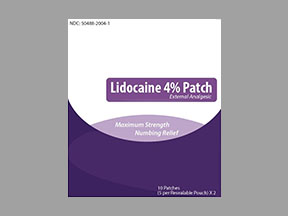
Eq Lidocaine Pain Relieving Coupons & Savings Card – Discount Prices from $22.03
Brand for: Lidocaine
My prescription
Edit
4%, Lidocaine (30 Patches)
Select pharmacy

Walgreens
$22.03
COUPON PRICE
Albertsons
$26.56
COUPON PRICE
Walmart
$41.35
COUPON PRICEEq Lidocaine Pain Relieving savings card
Show this card to your pharmacist
Walgreens
$22.03
BIN
ID
PCN
GRP
015995
LHKPY247289
GDC
DR33
Powered by
More prescriptions for postherpetic neuralgia
More prescriptions for postherpetic neuralgia
Eq Lidocaine Pain Relieving (Lidocaine) dosage forms
Dosage Quantity Price from Per unit 4% 30 Patches $37.71 $1.26 4% 1 Patch $9.96 $9.96 4% 10 Patches $18.57 $1.86 4% 15 Patches $23.36 $1.56
| Dosage | Quantity | Price from | Per unit |
|---|---|---|---|
| 4% | 30 Patches | $37.71 | $1.26 |
| 4% | 1 Patch | $9.96 | $9.96 |
| 4% | 10 Patches | $18.57 | $1.86 |
| 4% | 15 Patches | $23.36 | $1.56 |
Can lidocaine be used as a painkiller?
Yes, lidocaine can be used as a painkiller. It is a local anesthetic that works by numbing specific areas of the body to relieve pain. It is commonly used in various forms, such as topical creams, patches, or injections, to manage pain from minor injuries, procedures, or conditions like neuropathic pain.
Does lidocaine have narcotics in it?
Lidocaine does not contain narcotics. It is a local anesthetic used to numb tissue in a specific area and does not have the properties of narcotic drugs.
Using the SaveHealth discount card, what is the price of Eq Lidocaine Pain Relieving without insurance?
Using the SaveHealth discount card, the price of Eq Lidocaine Pain Relieving without insurance is $22.03.
What is the price of Eq Lidocaine Pain Relieving at Walgreens?
The price of Eq Lidocaine Pain Relieving at Walgreens is $22.03.
What is the price of Eq Lidocaine Pain Relieving at Walmart?
The price of Eq Lidocaine Pain Relieving at Walmart is $41.35.
